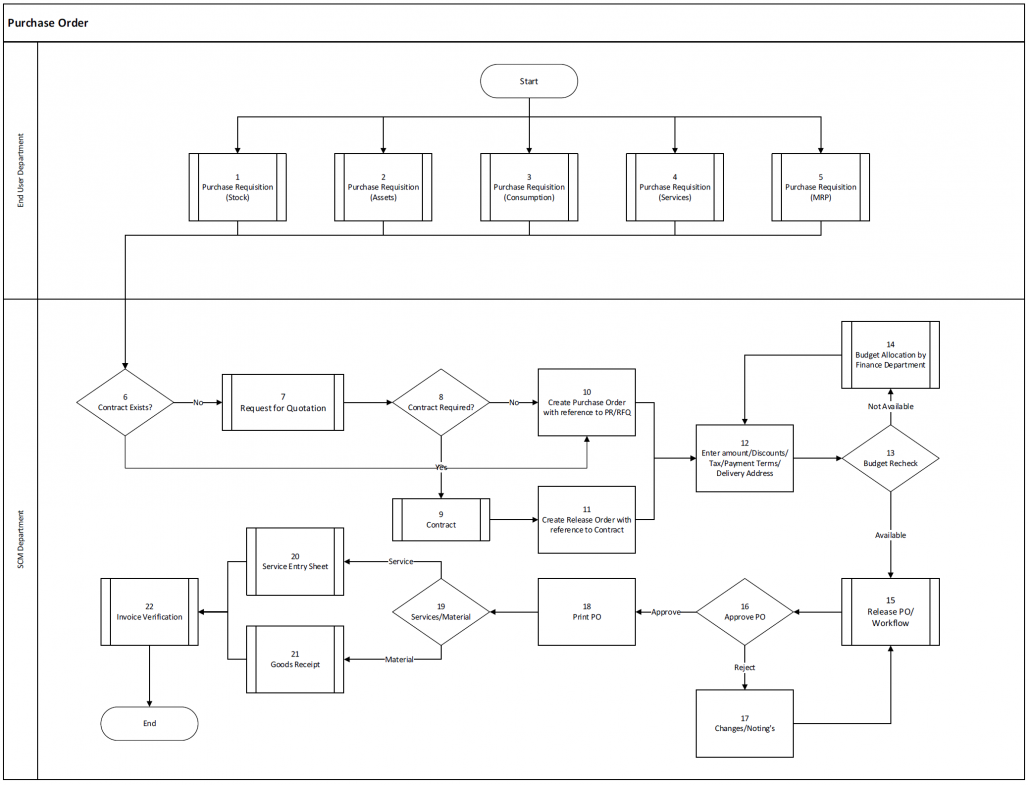This post captures a sample to-be Purchase Order process in SAP MM Purchasing module to give an idea to MM consultants for their Business Blueprint (BBP) documentations.

A purchase order (PO) is a formal request or instruction from a purchasing organization to a vendor or a plant to supply or provide a certain quantity of goods or services at or by a certain point in time.
It forms part of the procurement process where requirement is converted to a commitment to purchase. However, it is not necessary to start the process from requirement processing as it can be created directly in the system dependent on the operation need.
SAP MM BBP To-Be Explanation of Purchase Order
SAP MM offers a comprehensive functionality of Purchase Order (PO).
You specify in the purchase order whether the material is delivered for stock or for direct consumption (for example, cost center and asset). The goods receipt and invoice verification are usually carried out on the basis of the purchase order.
PO can be generated in the system with reference to a contract already established in the system or directly with reference to PR or RFQ. The major categories of Purchase Orders in SAP are:
- Standard PO – Created with reference to RFQ, PR, Contract and existing PO or can be entered directly.
- Contract Release Order – A purchase order with reference to an already existing contract in SAP.
- Frame Work Order – Used for procurement of services. A special type of Framework order is Blanket Purchase Order that does not require Goods Receipts. It can be used for rental agreements, marketing services etc.
- Stock Transport Order – Used for plant to plant transfers of materials within organization
In a purchase order, you can procure materials or services for all plants attached to your purchasing organization. Just to have an idea about SAP functionality, it is worth mentioning here that in order to accelerate data entry into the system, SAP also offers Personal settings, and the system considers user-specific requirements. Each user can set his or her own default values, or specify that the document overview is automatically set up when the transaction is started.
Imports: Besides local purchasing, the company may also import materials and services from abroad. The basic difference between local purchasing and imports are different payment terms, delivery terms, pricing conditions, shipping details and duty structure. By the time delivery reaches to Company some of these terms of imports become delivery cost of material / services and hence become a considerable part of material valuation.
SAP offers provisions for import purchasing and specially the type of duties used in the imports. These duties are comprehensively incorporated in the pricing schema and shall be the part of PO. The duties applicable on imports can be based on fixed percentage, quantity based (volume based) and absolute value.
SAP offers Materials to be purchased free of cost. This process is applied for Company receives free materials with every purchase for specific materials as a warranty cover which is already agreed with the vendor. Moreover its inventory value will be calculated on moving average price hence decreasing the value of the whole lot. Following variables of duties are incorporated in the pricing schema.
- Custom Duty (CD)
- Additional Custom Duty (ACD)
- Sales Tax (ST)
- Additional Sales Tax (AST)
- Income Tax (IT)
- Regulatory Duty (RD)
Calculations may be based on the formula given below:
- Custom Duty = % of Assessed Value of the item
- Additional Custom Duty = % of Assessed Value of the Item
- Sales Tax = % (Assessed Value + Custom + A. Custom Duty)
- Additional Tax = % (Assessed Value + Custom + A. Custom Duty)
- Income Tax = % (Assessed Value + CD + ACD + ST + AST)
A Purchase Order can be created in SAP, both with reference to contract as well as with reference to PR or RFQ. If a requirement arises with reference to a contract, then manager procurement shall generate the Contract Release Order with reference to already established contract in the SAP, besides Contract Release Order, Manager SCM / Contracts / Admin / Region shall create Standard PO with reference to PR or RFQ, Contract PO will then release and forward in the system to approving authority.
